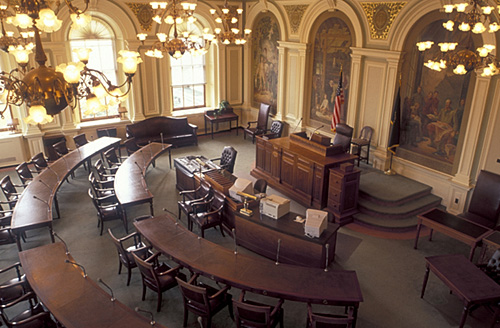Having tried in the past to bring casino gaming to the state of New Hampshire in 2015, Senator Lou D’Allesandro is at it again. The senator recently proposed Senate Bill 242 which would see two casinos constructed in the state, bringing a big increase in revenues to the economy.
The proposal estimates that as much as $195 million would be generated in annual revenue from the two casinos and local communities would benefit from just over $25 million of that amount each year. The state is reportedly losing money, according to D’Allesandro, due to casinos in neighboring states such as Maine and Massachusetts gaining customers from New Hampshire.
The measure will be heard by the Senate Ways and Means Committee at 10 a.m. in the Statehouse this Wednesday as one of several gaming bills to be considered during the current legislative sessions. Representative Gary Azarian is presenting a bill as well, one to provide keno gaming to the state.
D’Allesandro stated in the EagleTribune that with two casinos, the state has the opportunity to create hundreds of jobs and bring in hundreds of millions of dollars into the state, which will be helpful to the struggling communities. According to the Senator, ‘the majority of the people of New Hampshire are in favor of gaming and it’s time for the Legislature to listen’.
In the past, proposed casino bills were focused on creating a gaming venue in Salem at the former race track known as Rockingham Park. In 2016, the owners of Rockingham ceased operations after more than 100 years of thoroughbred and harness racing took place in the region. When the venue shut down, they had only provided charity gaming and horse racing simulcasts.
With the proposed measure Senate Bill 242, a specific location is not pinpointed for the casinos. This could see another former track take on casino gaming, Seabrook Park. Located off I-95, Seabrook Park is near major cities and could see heavy foot traffic if casino gaming were allowed.
Seabrook Park is open to casino gaming as the venue already provides charity gambling as well as dog and horse race simulcasts from races that take place from around the country. In the past, the Board of Selectmen for Seabrook have been open to casino gaming and have hoped that their location would be a chosen site.
Days before the senate bill was introduced, Joseph Faro, a restaurateur, proposed a development for the Tuscan Village which would bring 5,000 jobs to the former racetrack, Rockingham. Last week, Faro went before the Salem Planning Board and presented his plans for a commercial and residential development in the area, suggesting as much as $11 million in revenues would be created locally plus additional monies via impact fees.
Essentially, the state is now considering as to if the former track should become a gaming venue or a commercial and real estate development. If Faro has his way, the area would be developed to include a townhouse project, apartment project, luxury hotel, theater, restaurants, grocery stores and more.
Gaming proposals may have more support as Representative Robert Elliott has stated he is in favor of gaming, including the bill by D’Allesandro and the keno legislation.



